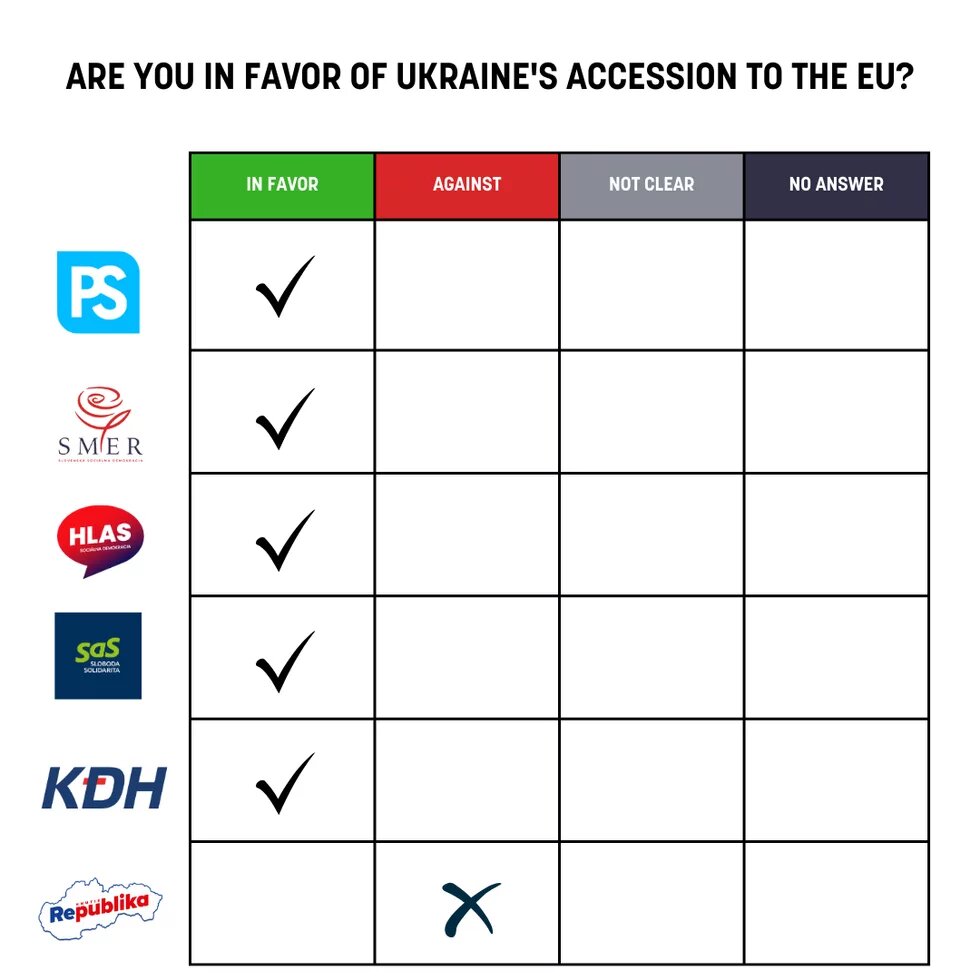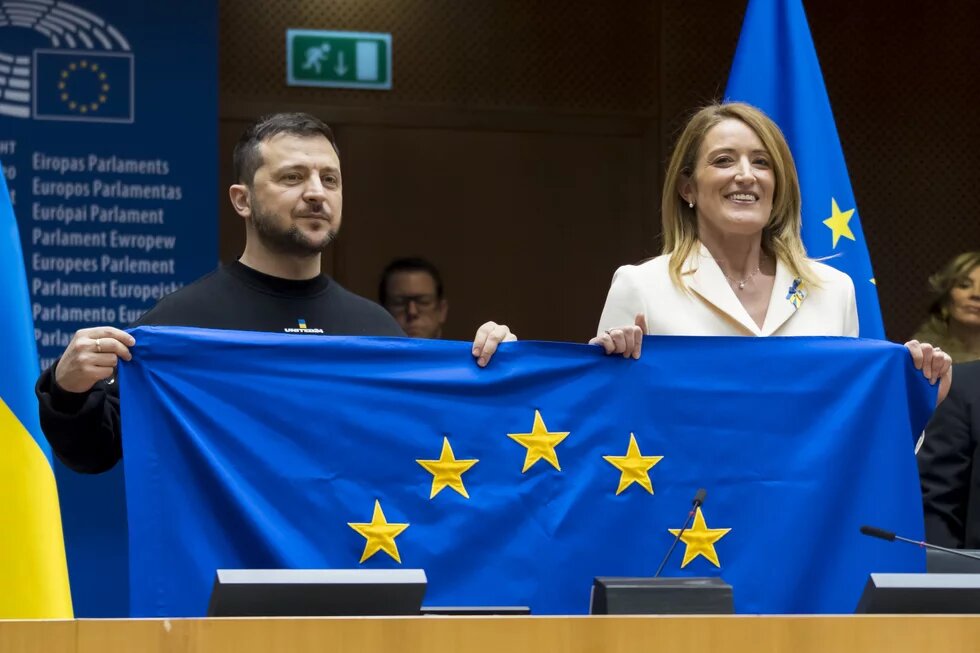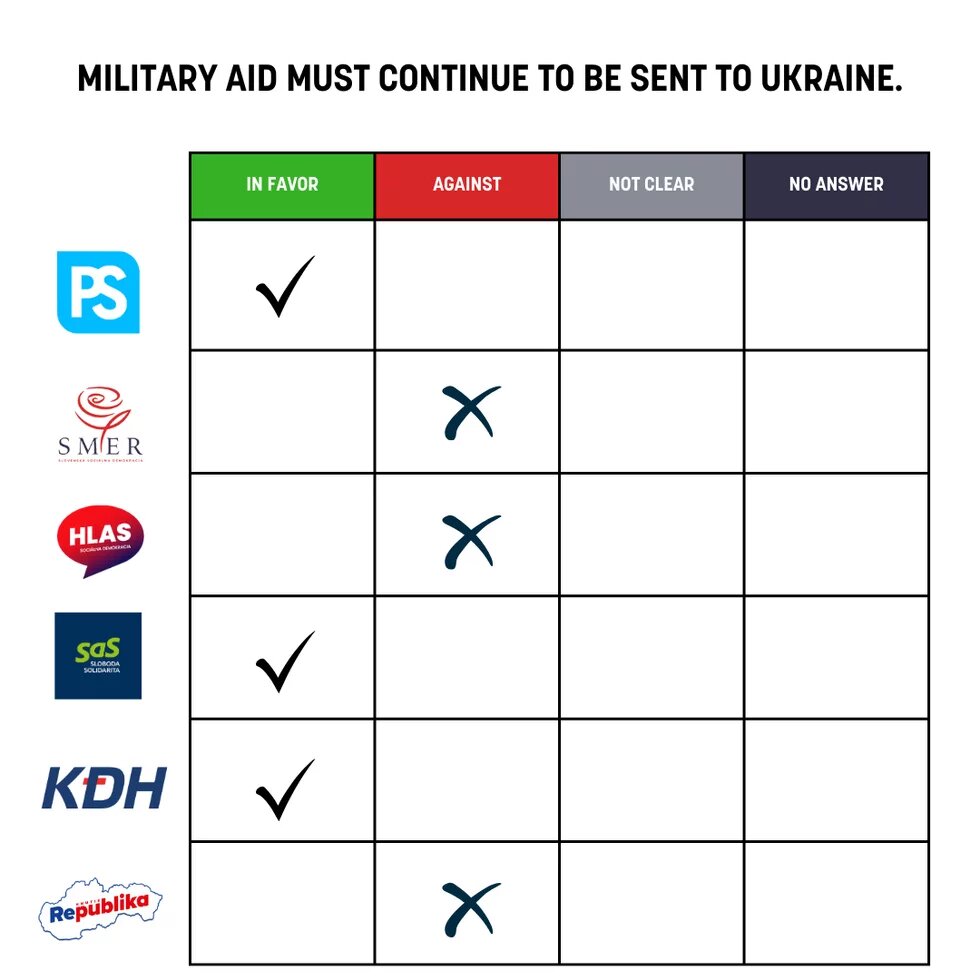
The major points of friction in foreign policy can be observed when it comes to the issue of military support for Ukraine and keeping of the veto right. Other timely topics that are almost completely absent from the parties' manifestos include, for example, the war in the Gaza Strip or relations with China.
This article is part of the EURACTIV Slovakia Special: Euro Elections 2024: Analysis of programmes and attitudes of political parties.

The topic of foreign policy surprisingly turned out to be one of the crucial points in the presidential elections held in April this year. The European elections held in June will be specific for Slovakia in the aftermath of the assassination attempt aimed at Prime Minister Robert Fico, which took place less than a month before the planned election date. In response to the event, several parties announced a suspension or silencing of their campaign, which was also called for by president-elect Peter Pellegrini (Hlas-SD).
Before the assassination attempt, one of the key narratives in the campaign reflected concerns about a change in Slovakia's foreign policy course turning towards the East or the country's possible international isolation. These concerns arose, in particular, due to controversial steps and reforms of the current government, which stirred nationwide protests and repeated criticism from the European Commission.
The main foreign policy expert of the German CDU party, Norbert Röttgen, even stated that Slovakia must decide whether it wants to stay in the EU or follow Hungarian Prime Minister Viktor Orbán. However, all the analysed parties declare intention of remaining in the EU, including Republika, which, nevertheless, speaks of the need for "fundamental reform". According to the party, the referendum on exiting the EU should come into play if no changes are implemented.
The ruling party Hlas-SD did not publish its programme for the EU elections, Smer-SD did so only in mid-May. Together with the Republic party, they did not answer any questions sent to them. Therefore, in addition to the current programmes (if any), the results of the analysis also reflect party theses published in the run-up for the 2023 parliamentary elections, public statements made by the politicians or reactions provided to EURACTIV Slovakia.
Focus has been given to five main areas – relations with Russia, relations with Ukraine, the right of veto, European security and EU enlargement in the Western Balkans. Still, there were some topics that were almost completely absent from the party programmes, such as the war in the Gaza Strip or bilateral relations with China.
Relations with Ukraine
Kyiv's EU accession
It was Ukraine's desire to become a member of the European Union that led the country to Euromaidan protests in 2014, and in the midst of the all-out war in 2022, Kyiv finally managed to obtain candidate status together with Moldova.
President of the European Commission Ursula von der Leyen praised Kyiv for its rapid progress in reforms that are prerequisite for its future accession to the Union. These include changes to the judicial system, limiting the influence of oligarchs or combating money laundering, all of which the country closely consults with the EU. It is worth noting that while Slovakia abolished the Special Prosecutor's Office, Ukrainians established this office as part of the above reforms.
However, even these efforts were not enough to suppress the concerns among some European politicians that Kyiv would not in fact be ready for the accession for a long time ahead. They also associate their uncertainty with the dilemma of how to proceed in the event that Ukraine fails to restore its internationally recognized borders from 1991 in the ongoing war. However, the precedent for this option has already been created by Cyprus, which accessed the EU in 2004 despite the ongoing territorial disputes with Turkey.
According to Politico, the European Union would like to open formal accession negotiations with Ukraine and Moldova on June 25 at the EU summit in Brussels. Looking at Slovak political parties, with the exception of Republika, all analysed parties officially declare their support for Ukraine's membership in the Union.
PS advocates Ukraine's membership in the EU. "No country has sacrificed so much for European ideals over the past decades as our eastern neighbour," the party states in its programme.
According to SaS, Kyiv's rapprochement with the EU will have positive benefits for both sides, especially for the regions bordering Ukraine.
KDH claims that it supports "the integration of a whole Ukraine into the EU". According to all three opposition parties, Ukraine's membership would be a boost for the entire European block, and they further emphasize that its accession would provide a significant economic boost to the regions of eastern Slovakia.
Republika, Smer-SD and Hlas-SD did not answer the questions sent, but their positions on the topic are known from their other public statements.
Despite the often blunt and undiplomatic rhetoric aimed at our eastern neighbour, Smer-SD supports Ukraine's accession to the Union. Party leader Robert Fico assured Ukrainian Prime Minister Denys Šmyhaľ of this position in April. He stated that he "does not intend to create any roadblocks in Kyiv's path to the EU" and he also signed up to this commitment in a joint memorandum.
During the most recent general elections, Hlas-SD also answered in the affirmative, albeit rather generally. According to Deputy Prime Minister Petr Kmec, any country that meets the required accession criteria and enters the pre-accession negotiations has the right to become a member of the EU. "Ukraine is engaged in a military conflict, so this question is irrelevant," he added.
In the most recent general elections, Republika adopted a negative attitude towards Ukraine's membership in both the EU and NATO. The party claims that "as a result, even the smallest border conflict with the Russian Federation could escalate the risk of unleashing World War III". In the European Parliament, the party voted against granting Ukraine the candidate status.
Military support of Ukraine
The military aid for Ukraine is a completely different question. Since the government of Robert Fico took office in October 2023, Slovakia has begun to advocate that at the top state level, it will only provide humanitarian aid to its eastern neighbour. The official position of the government is that "the conflict has no military solution" and peace negotiations between Moscow and Kyiv must be initiated immediately.
Ukrainians and Western officials repeat that if Ukraine stops fighting, it will lead to its demise, and, at the same time, that it is possible that Russia will not stop at the Ukrainian border. If, on the other hand, Russia which initiated the aggression stops fighting, the war will end.
PS is in favour of continuing to provide humanitarian, financial, diplomatic and military support to Kyiv. "Not only because it is the right and humane thing to do, but mainly because today the fight in Ukraine is also the fight for the security and independence of Slovakia and the rules of the game in the European playing field," the party emphasizes. Interestingly, the progressive party also aims to appoint a national coordinator for assisting with the reconstruction of Ukraine.
According to the SaS foreign security expert Juraj Krupa, Ukraine must be supported both in terms of humanitarian and militarily aid until the war ends and Ukraine emerges victorious. "If the narrative were true that sending weapons to Ukraine would draw us into a war with Russia, several countries would have been actively engaged in the war a long time ago," the MP pointed out.
Republika criticizes military assistance to Ukraine and states on its website that "in the pursuit of a neutral foreign policy, we are fundamentally opposed to drawing Slovakia into the military conflict, opposed to sending weapons to the Ukrainian government and transporting weapons through Slovak territory".
Smer-SD and Hlas-SD did not answer questions from EURACTIV Slovakia. Based on their public statements, it is well-known that they share a similar opinion on the subject as Republika does. Politicians from Smer have been known for slogans such as "not a single bullet for Ukraine" and that "(weapon) deliveries only prolong the conflict".
The opinion of Hlas-SD is particularly interesting, since the party still supported military assistance to Ukraine only a year ago. At that time, the party was criticized for this stance also by its current coalition partner, SNS.
When confronted with these statements, Peter Pellegrini stated that the situation has changed since then. He referred, for example, to the two-year duration of the conflict or the fact that Slovakia allegedly no longer has the capacity to provide military assistance to Ukraine.
Nevertheless, both Hlas-SD and Smer-SD continue to support the supply of weapons on a commercial basis.
Relations with Russia
Russia invaded its neighbour Ukraine in an unprovoked attack more than two years ago. Since then, the European Union has agreed on as many as 13 packages of sanctions, with the last one coming into force on the second anniversary of the war. The EU 27 is already planning a 14th package of restrictions, which could for the first time also include Russian natural gas.
Several experts point out that the sanctions are insufficient and do not have as much of a deterrent effect on Russia as perhaps desired. The widow of the late leader of the Russian opposition, Alexei Navalny, also called for stricter interventions. "If you really want to defeat Putin, you have to become an innovator, and you have to stop being boring." said Julia Navalnaya in the European Parliament.
There are also critical voices that are against further sanctions or throw up roadblocks in the process of approval. These include, for example, Slovakia’s neighbour Hungary.
Despite different views on overall relations with Russia, where the ruling coalition is pushing for more contact with Moscow, while most of the opposition calls for the exact opposite, there seems to be some kind of consensus when it comes to the sanctions.
PS supports the EU's sanctions policy towards Russia and Belarus. The party believes that owing to the sanctions, Russian President Vladimir Putin has less resources to buy weapons and recruit troops for his aggression. According to the progressives, European measures also put more pressure on the Kremlin regime testing its endurance.
SaS emphasizes that invasion of Ukraine by Russia is a gross and unacceptable violation of international law, and it is absolutely necessary for the community of EU Member States to handle the economic sanctions against the aggressor in a uniform manner. "We will therefore support sanctions against Russia and drive the increase in their effectiveness, for example by introducing sanctions on companies that help Russia circumvent the existing sanctions," the liberals write. At the same time, they talk about supporting the use of frozen Russian assets to aid the reconstruction and rebuilding of Ukraine after the war.
KDH also talks about this form of support, further underlining the importance of these assets in the reconstruction of Ukraine. "At the same time, we believe that it is essential that such actions have a clear legal basis," adds party spokesperson Lenka Halamová. The Party intends to continue in their support of anti-Russian sanctions in order to “sanction persons and entities directly responsible for specific human suffering”. Christian democrats also believe that further restrictions should be aimed at addressing the circumvention of sanctions, "such as by Chinese companies or other authoritarian regimes that directly or indirectly enable Putin's aggression and oppression at home."
In the party manifesto for the general elections held in September last year, Smer-SD stated that it intended to assess sanctions against "any country in the world" not only "on the basis of their efficiency" but in particular "on the basis of the economic and social impact of such sanctions on Slovakia". After returning to the Prime Minister's office, Robert Fico, the party leader reiterated his position that he is not categorically opposed to sanctions on Russia.
Representatives of Smer often say that the current sanctions are harmful to Slovakia. However, unlike Viktor Orbán, the Slovak government comprising Smer, Hlas and SNS has not thwarted any European sanctions so far, while providing support to the package of aid to Ukraine. At the same time, it endorses the claim that by attacking Ukraine, Russia violated international law.
The only party analysed that opposes any further sanctions is Republika In its Euro-election declaration, the latter proclaims that it is opposed to imposing European restrictions on Moscow. Before the last general elections held in September 2023, the party also claimed it wanted to "also develop trade relations" with Russia.
Keeping of the veto
In the wake of the multiple crises that the world and the EU have faced in recent years, the voices pointing out to the "rigidity" of the current decision-making system in the Union have grown stronger. Especially with regards to the war in Ukraine, there was criticism that the EU decision-making abilities showed very slow pace hampered by bureaucracy.
In Brussels, there is increasing talk of changing the voting system in the area of the Common Foreign and Security Policy (CFSP) or expanding the list of areas where a decision by a so-called qualified majority would be sufficient.
This is achieved in case of a vote of at least 55% of the Member States (currently 15) in favour of the proposal with a simultaneous support by countries representing at least 65% of the total EU population. With the exception of sensitive topics such as the CFSP, this method applies to as much as 80 percent of legislation voted on in the Council.
However, the retention of the right of veto in areas where it is still applied has become a sensitive topic in Slovakia. In addition to the CFSP, countries can use their veto, for example, in the vote on European budget and taxation, EU membership and citizenship, in certain regulations concerning the field of justice, social security or internal affairs.
In particular, the parties with a stronger national affiliation vigorously defend the preservation of the veto and issue a warning that its termination poses a threat to Slovakia's sovereign decision-making as a country.
Already in the run-up to the last year’s general elections, EURACTIV Slovensko asked the parties whether or not they would support the application of qualified majority vote in the field of CFSP. All parties were opposed to the idea, except for PS and SaS. Even with a more open wording of the question, the results of our inquiry are more or less the same.
PS appears to be the party most open to modifications in the field of the veto right. In the part of their programme entitled "A Stronger European Union", the party states that among other things in the EU framework, it will support the transition to majority voting in selected areas of foreign and defence policy. "The EU empowers Slovakia to achieve goals and ambitions beyond reach of any small country alone. To achieve this, the Union cannot afford to remain gridlocked on crucial matters," the party argues.
Although advocating the preservation of the right of veto on issues of Slovakia’s key national interests, SaS is also open to discussion. The party defines the above interest as the matters of direct and indirect taxation, the long-term EU budget, new European taxes or legal areas violating the principle of subsidiarity. According to the party, the veto should mainly be perceived as a political tool ensuring that the voice of the small member states also remains heard. "However, we are ready to discuss the waiver of the right of veto where it is more advantageous for Slovakia," the party concludes in its programme.
For KDH, preserving this particular competence is clearly one of the priorities – the party indicates this intention as the very first item on its programme for European elections. Christian Democrats consider the retention of the right of veto in its current form as "crucial for the sovereignty of Slovakia". "It is exactly the efforts of leftist and progressive forces to impose their view of society as the only possible one, or attempts to open up European treaties that create fertile ground for the rise of populism and extremism across Europe," the party explains its position.
Although Republika did not answer the questions sent, their programme speaks of "protecting Slovak sovereignty and preserving the right of veto".
Smer-SD’s programme for the EU elections reads that “preserving the veto is vitally important for Slovakia” and therefore they are “opposed to any discussion that would bring about a change in the way of voting”.
Concerning Hlas-SD, its leader Peter Pellegrini declared during the presidential election that he would "never allow Slovakia to lose its veto right". According to Pellegrini, it is the veto that makes Bratislava an equal partner with large countries in the EU and he considers the possible elimination of this competence to be a "dangerous gamble with Slovak sovereignty", which would "help Brussels, not Slovakia".
European security
The Russian invasion in 2022 irreversibly reshuffled the security situation on the European continent. Within two years of the invasion, the change in discourse resulted in Finland and Sweden, both previously neutral countries, to take historic turns as they decided to join the ranks of NATO.
It was only after the Russian aggression, when numerous member states began to take their commitments to NATO more seriously. Their concerns have recently been further fuelled by the fear of Donald Trump's return to the White House. The Republican candidate has already publicly stated that in the event of an attack, the United States under his leadership would only help those Alliance members that were fulfilling their obligations – referring to the commitment to allocate at least two percent of their GDP to their defence budgets.
Having endured past hardships and negative historical experience, it is in particular the states neighbouring Russia that are taking steps to significantly strengthen their defences. Polish President Andrzej Duda has already suggested that thoughts could be given to the possibility of increasing the NATO member defence contribution commitment to three percent of the country's GDP.
Among the Slovak political parties, PS and KDH openly talk about the need to invest at least two percent of GDP. Other parties fail to offer a clear answer, or they simply don’t provide it at all.
PS states in its programme that it will support the agreement of member countries to invest at least two percent of GDP in defence, of which the minimum of 20% should be allocated to modernization," writes Tomáš Valášek, the authority of the party in this field. At the same time, the party intends to strengthen the personnel and technical link between Slovakia and the Alliance while working to deepen European defence cooperation.
The need to continue closer cooperation in the European defence industry is also a topic mentioned by SaS. The party underlines that the EU has been relying on US military assistance for 80 years, and due to the current security risks, member states must take more responsibility for their defence into their own hands. In SaS, they talk of promoting "consistent" fulfilment of the current defence commitment. Moreover, according to the party, the above-mentioned two percent of GDP must be considered "a necessary minimum expenditure and not a maximum target level".
KDH says it has long advocated for meeting of defence investment commitment at a minimum level of two percent of GDP. Upholding this commitment is considered essential for the country's best interests, emphasises the party. The issue of the European military force, which is also being temporarily discussed, is perceived as an unnecessary distraction from addressing the key challenges in our defence capabilities, adds the spokesperson of the Christian Democrats.
Hlas-SD, Smer-SD and Republika did not answer the question concerning this topic. However, the coalition led by prime minister Robert Fico committed in its Government Manifesto to support the fulfilment of obligations arising from NATO membership. He also adds that "the Slovak Republic will continue to be a trusted and supportive ally". Republika, in turn, is pursuing the policy of achieving Slovakia's neutrality, which, in fact, would require a sharp increase in defence budget allocation.
EU enlargement in the Western Balkans
The countries of the Western Balkans have been trying to become EU members for over 20 years. The EU has developed a policy to support the gradual integration of the Western Balkan countries into the Union, however, during this entire time, only Croatia joined the EU back in 2013. The remaining countries, namely Albania, Bosnia and Herzegovina, Montenegro, North Macedonia and Serbia, have been granted candidate status. Kosovo has applied to join the EU, but several members states, including Slovakia, do not recognize it as a country.
Except for Serbia, which has since taken a pro-Russian stance, there is very strong support for joining the EU in all the other countries, as confirmed by a May 2024 survey by the International Republican Institute.
However, the drawn-out nature of the entire process has already caused that a significant portion of the local populations are sceptical about whether it will ever be successful. The same survey mentions that at least a one in three people in each of the above countries doubts that Brussels is actually serious about their EU accession.
In its programme, SP states quite briefly that it will "support the enlargement of the EU to include those candidate countries that meet the membership criteria".
SaS declares that after meeting all the accession criteria and joining the EU s restrictive measures against Russia, it will support the EU accession of Ukraine, the countries of the Western Balkans as well as Georgia.
In its programme, KDH promotes "acceleration of the accession process with countries that are making progress in meeting of the criteria, although perhaps slower than expected". The party points out that after the outbreak of war in Ukraine, defending peace in Europe has become even more urgent and "stabilization of the situation in the Balkans can also help."
KDH’s MEP Miriam Lexmann said that dragging out the process with the Western Balkans is "a strategic failure of the EU, especially from the security point of view". She warns that the prolonged wait has made candidate countries vulnerable to the growing influence of non-democratic regimes, particularly Russia and China.
Minister of Foreign Affairs Juraj Blanár (Smer-SD) emphasized that Slovak government supports the accession of the Western Balkan countries to the EU. He added that accelerating the processes leading to their accession to the European Union would "help stabilize a region once torn apart by military conflicts."
This text was originally published on euractiv.sk.






